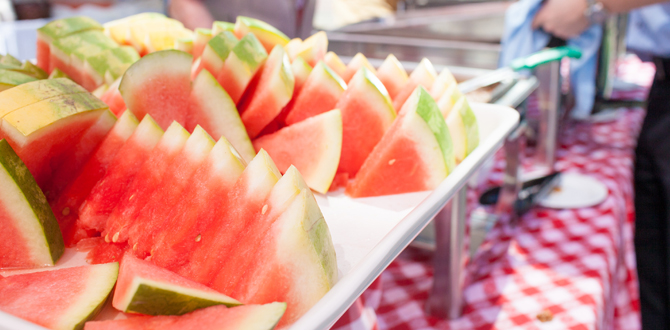This article provided by Comfort Keepers, an independent caregiving provider in the Masonic Value Network
Clearing the Plate
Think back to a time when you were a child and your parents made you eat all of the vegetables and fruits from your plate. Although it may have seemed like a chore at the time, it should seem obvious now that they were doing you a favor. Fruits and vegetables were important then for your growth and wellbeing, but as we begin to age, they become increasingly vital. In many cases, these are the foods that play an important role in reducing the risk of serious conditions and diseases later in life, including heart disease, stroke, hypertension, digestive problems, and even forms of cancer.
In fact, there are a number of fruits and vegetables that have been classified as “superfoods.” This signifies that they represent an all-natural (generally plant-based) source of vitamins, minerals, and other nutrients conducive to healthy living. And because these foods are so nutrient-dense, they are ideal for aging adults, who are often challenged with reaching their required daily intake of essential vitamins, folic acid, and niacin.
Below you will find some of the fruit and vegetable superfoods that your aging loved ones can incorporate into their diets. Be sure that they consult a physician before modifying any diet, especially if they do not have a comprehensive understanding of their food allergies.
Fruit and Vegetable Superfoods for Seniors
- Blueberries: Packed with vitamins C and K, blueberries provide seemingly innumerable health benefits. Regular consumption has been linked to maintenance of brain functionality, due primarily to high flavonoid levels. Its manganese levels help regulate metabolism, while the fiber lowers cholesterol and, in turn, maintains blood sugar.
- Apples: Similar to blueberries, apples are a significant source of soluble fiber (daily consumption is said to reduce LDL cholesterol by 40%), but they’re also rich in potassium and vitamin C, both of which benefit blood pressure. Moreover, apple skin contains an antioxidant called quercetin that provides antihistamine and anti-inflammatory support.
- Cherries: Did you know that cherries get their red color from an antioxidant known as anthocyanin? Not only does it provide the small fruit with a vibrant color, it gives it some pretty significant inflammation-reducing and triglyceride-lowering power. Cherries can also help regulate sleep cycles because of their melatonin richness.
- Grapes: In addition to its abundance of resveratrol, a powerful antioxidant that helps promote heart health, studies have shown that the seed extract in grapes can potentially slow the development of Alzheimer’s disease.
- Asparagus: High in lycopene, which reduces the risk of prostate cancer, asparagus also helps the immune system with its plentiful supply of vitamin A. Additionally, its fiber contains prebiotics that promote healthy gut bacteria.
- Broccoli: It’s almost become a cliché, but broccoli could very well be considered a miracle food. With plentiful fiber, vitamins A, C, B9, and K, just about every aspect of your body is directly benefited. New research suggests that broccoli may also help aid in reducing the risk of certain cancers, due to its anti-carcinogenic compounds such as diindolylmethane and glucoraphanin. What’s more, many of its nutrients (zeaxanthin, beta-carotene, and phosphorus) protect the eyes from macular degeneration and cataracts.
- Kale: Often considered a close relative of broccoli, kale does just about everything, from protecting arteries to reducing cholesterol. And whether it’s prepared raw or cooked, these leafy greens are an excellent source of iron and fiber. Kale also contains a plethora of carotenoids and flavonoids – powerful antioxidants that can help protect the body from chronic diseases.
- Butternut Squash: Loaded with beta-carotene (essential for eye health) and vitamin C, this vegetable is a vital asset, especially when it comes to controlling blood pressure. And because of its high fiber, butternut squash is great for maintaining blood sugar and lowering cholesterol.
Fast Fact
Fruits and vegetables were important then for your growth and wellbeing, but as we begin to age, they become increasingly vital.
Comfort Keepers® Can Help
We understand how vital proper nutrition is for your aging loved ones. That’s why our caregivers – we call them Comfort Keepers® – help promote nutritious eating habits, as directed by a physician/dietitian. Additionally, we can help with everything from laundry to light housekeeping, and even incidental transportation. Contact your local Comfort Keepers office today for additional information.
References:
AARP. “Top 15 Superfoods for People Over 50” by Julia Bencomo Lobacco. Web. 2016.
Live Science. “What Are Superfoods?” by Christopher Wanjek. Web. 2015.
Health.com. “23 Healthiest Superfruits You Need Now” by Benjamin Packet
Everyday Health. “5 Tricks for Getting Enough Fruit and Veggies” by Krisha McCoy. Web. 2017.
MindBodyGreen. “Top 10 Health Benefits of Eating Kale” by Alison Lewis. Web. 2012.

